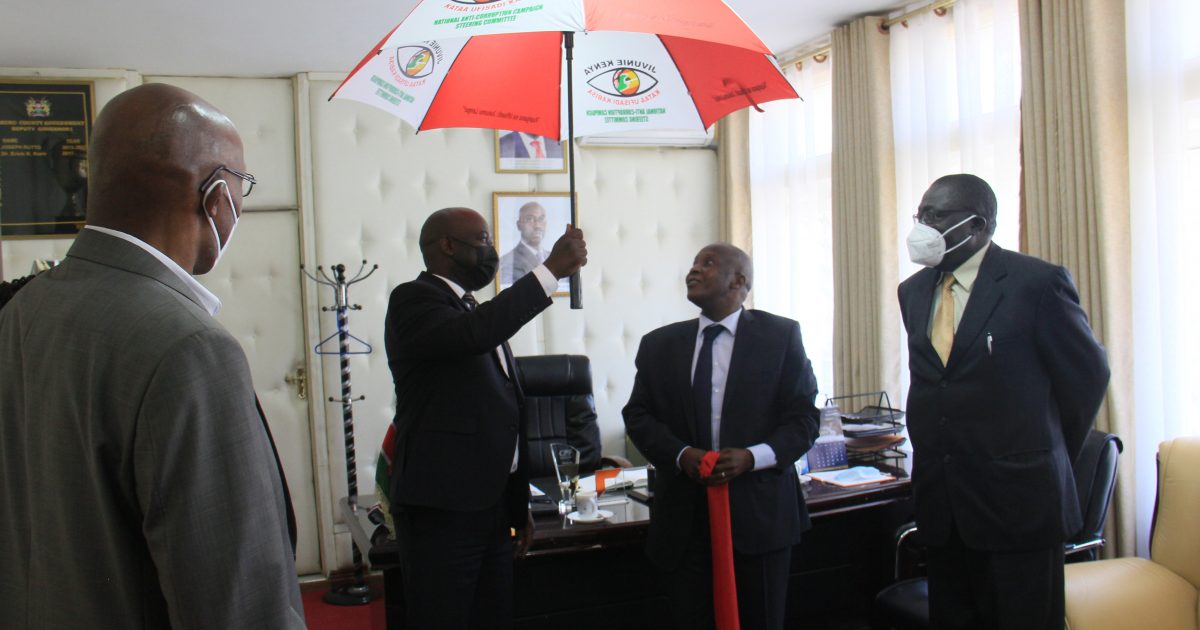Office of the Attorney General and Department of Justice Chief Administrative Secretary (CAS), Professor Ntiba Micheni, has called for implementation of anti-corruption studies in Kenya’s education curriculum, as part of measures aimed at preventing graft in the country.
Professor Micheni also stated that citizens need to change their mindset about the vice and stop viewing corruption as a way of seeking favours from public and private entities, or making quick money and amassing wealth without effort.
Speaking in Nakuru during a meeting between officials of the National Anti-Corruption Campaign Steering Committee, Deputy County Commissioner, Eric Wanyonyi, and Deputy Governor, Dr Eric Korir, the CAS observed that parents should do their part, by instilling in their children values of hard work, integrity and honesty.
“When an education system and parents instill in young minds such values, children will grow up appreciating transparency, accountability and respect for rule of law. Adults should stop paying bribes while seeking services, to win tenders, to avoid arrest or secure jobs or promotions at workplaces,” he observed.
Professor Micheni emphasised the need to promote anti-corruption activities and a culture of integrity, right from kindergartens to tertiary institutions, to make Kenya a corrupt-free nation.
“We want to inculcate in Kenya a culture that is fiercely against corruption. We believe that once people are taught ethics at a tender age, it will help them to grow up with morals and when they have morality, it helps in fighting corruption,” he added.
The CAS who was accompanied by the Director to National Anti-Corruption Campaign Steering Committee, David Gathi, indicated that the Office of the Attorney General and Department of Justice, was collaborating with faith-based institutions in the war against graft, because corruption can be checked with a change in attitude.
He urged students in institutions of higher learning and residents, to form Anti-Corruption clubs and work closely with County Anti-Corruption Civilian Oversight Committees (CACCOS), which are operational in Nakuru and other 30 devolved units.
Dr Korir called on relevant state agencies, to closely monitor financial dealings of politicians and their allies, in a bid to stop corruption as the country approaches next year’s General Election.
While noting that the culture of cash handouts by politicians to voters during electioneering period was a significant contributor to graft, Dr Korir indicated that there was an urgent need to plug all loopholes used by corrupt individuals, to steal public funds through proxies.
He lauded the Central Bank of Kenya for its onslaught on money laundering, to stop drug dealers, fraudsters, tax evaders, corrupt politicians and terrorist groups, from laundering their cash in Kenya.
In 2019, the banking regulator issued a circular to lenders to increase scrutiny on accounts of politicians and senior government officials, NGOs and cash-intensive businesses such as supermarkets, liquor stores and car dealerships.
The circular on money laundering also sought to tighten oversight on businesses operated by professional service providers, foreigners, casinos, real estate dealers and dealers in precious metals.
Mr Gathi said the CACCOS are mandated to undertake sensitisation and awareness creation campaigns up to the grassroots, monitor and address corruption in the implementation of public projects through social audits and reporting forums.
The oversight committees draw their membership from religious institutions, Maendeleo ya Wanawake Organisation, National Youth Council and National Council for the Persons with Disabilities.
They are further charged with the responsibility of providing support mechanisms necessary for members of the public to fight and prevent corruption and create effective networks and linkages with County and National Governments in the war against graft.
Mr Gathi indicated inadequate or lack of access to information on public projects, low involvement of members of the public in identification, prioritisation and implementation of public projects and lack of citizen ownership of public projects resulting in theft and misuse of materials were hampering the war on corruption.
“Inadequate participation by citizens and the implementation officers in social audit forums and lack of structured mechanisms to follow up with relevant institutions is hurting accountability during implementation of public projects,” he pointed out.
The Director to National Anti-Corruption Campaign Steering Committee indicated that in some cases, public projects are implemented without properly constituted management committees, a situation he observed promoted graft.
By Anne Mwale and David Opingo




